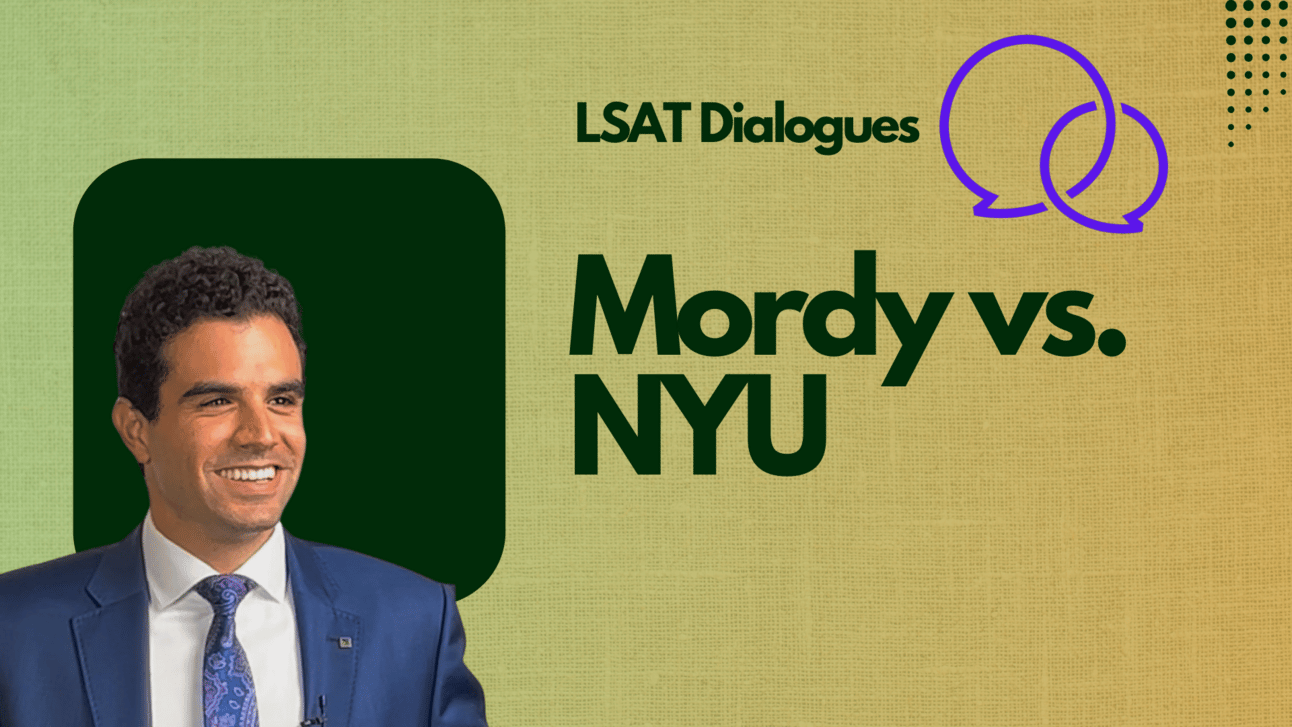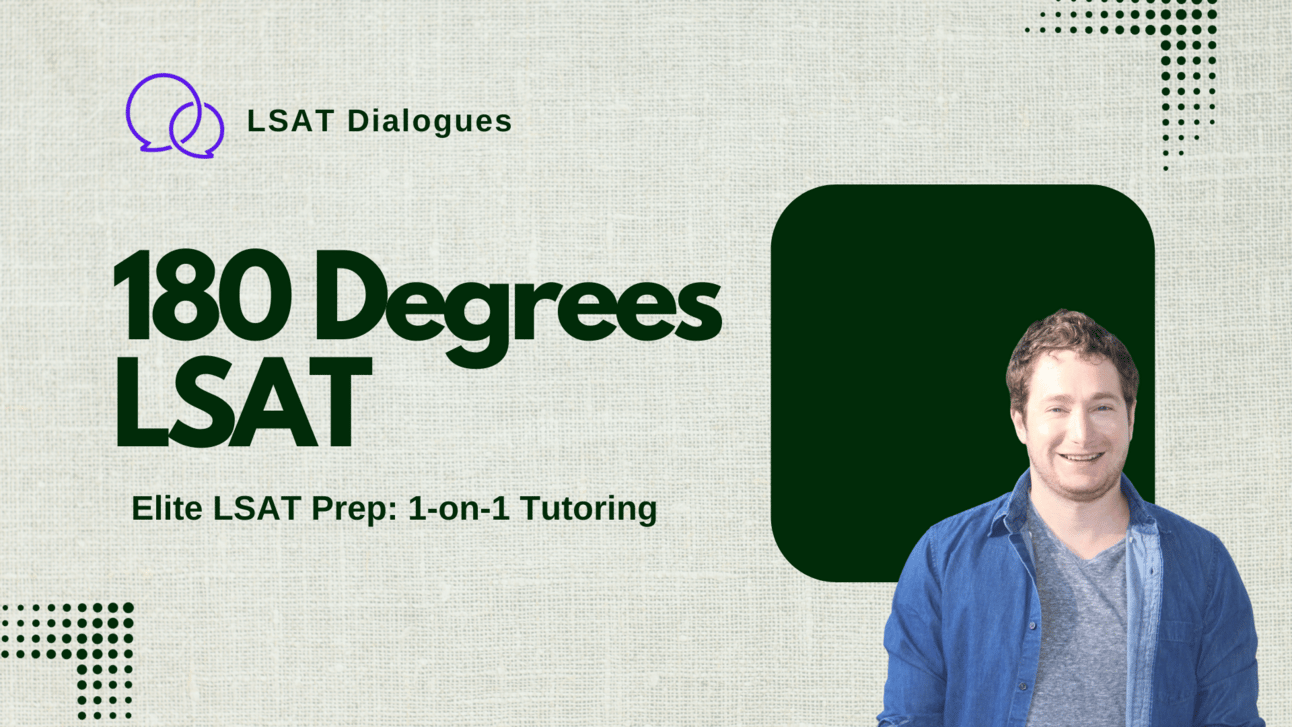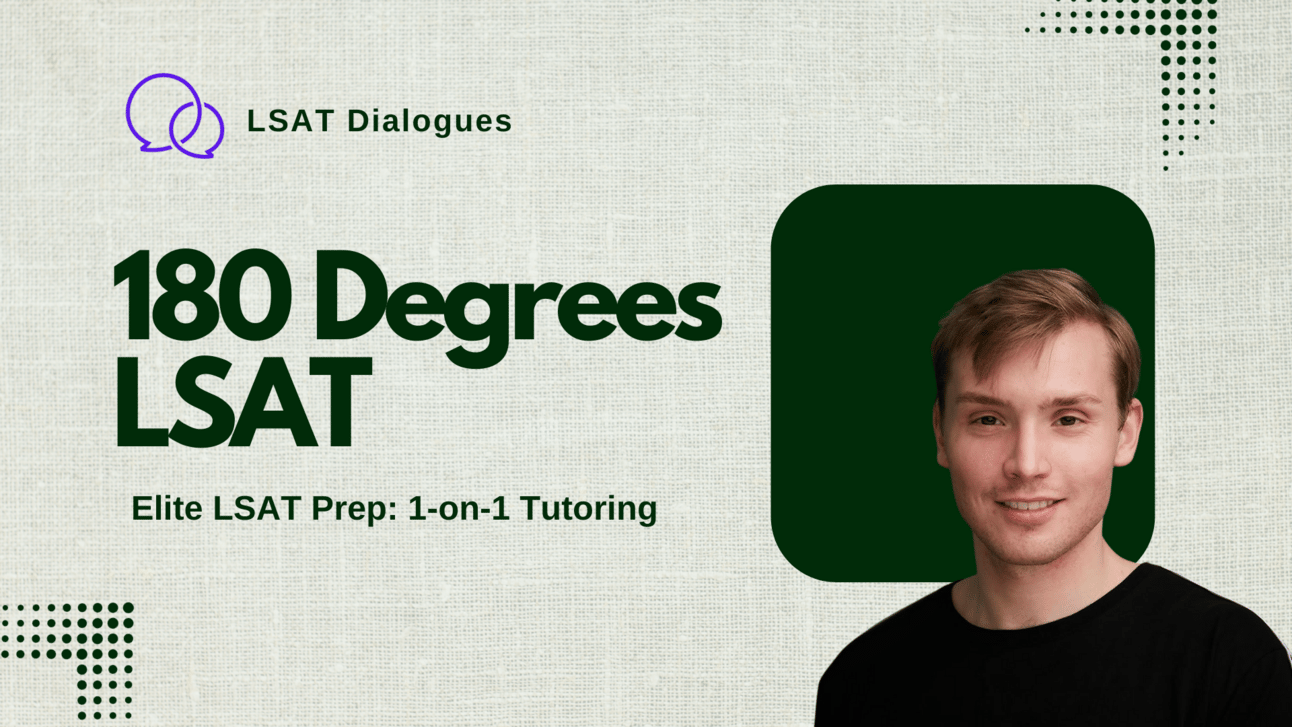- LSAT Dialogues
- Posts
- NYU Vs Mordy
NYU Vs Mordy
Spoiler: They Both Won

Interview with Mordy
Commentary from Larkin Robson
Helpful Links
About 180 Degrees LSAT
👋 Hi, Welcome to LSAT Dialogues
Studying for the LSAT and applying to Law School can be a lonely and frustrating experience. Hearing stories from others about what worked (and what didn’t) can make the process better, though.
Today, we chat with Mordechai Weiss about how he realized his dream of going to NYU.
Stats:
3.9 at Yeshiva University
168 LSAT

Was the LSAT a battle for you?
When it came to the LSAT, it was a new experience, because I never read. I was truly illiterate. I could barely read anything. My vocab was garbage.
One thing I tell students considering studying for the LSAT is to immediately pick up the Wall Street Journal and start ripping through it. Sit down and read. Like if you’re a couple years away from applying to law school, try replacing some tik tok time with reading a newspaper.
So you weren’t a reader – why did you want to go to law school?
I started a company during undergrad — a startup. I was working on and able to largely bootstrap it but I ended up spending a lot on a lawyer. To trademark the name of the company it ended up costing 15k. To create a Delaware C Corp, it was another five or six thousand. I just couldn’t believe how regulatory heavy business was. I didn’t want to be in a position where I needed someone else to operate my business.
I don’t think I learned anything in undergrad, but law school was extremely rewarding – an academic bootcamp. It ended up being a great decision.
How did you go from illiterate to getting into a top law school and doing well?
It was a process. At the beginning I couldn’t sit still very long. First day I did 20 minutes. Then the next day I was trying to do 22 minutes of continuous focus. Then 30 or 40. Now I can sit and focus for 3 hours at a time.
People expect… like any other area of life, let's say basketball, you would never get on a basketball court and be able to dunk it immediately. This is a metaphor I have for modern day education. I step on a basketball court, and I grab a basketball and I try to dunk and miss, and every coach around me goes, oh my god, there's something wrong with him, he couldn't dunk. Even though he's never hit the gym. Even though he's never worked on his agility or stretched. There's something wrong with me because I can't dunk.
Or maybe it's because I haven't put in the hundreds or 1000s of hours.
Similarly, when it comes to academia, people think that you should start right away and be able to sit and focus without forcing your body and fighting against your natural urge to get up, walk around and do things that are enjoyable. Or that you just have all the skills you need.
I took a small LSAT course and studied eight to ten hours a day. I don’t think every student has to do that. If you have a better foundation you won’t have to work as hard.
Reading comprehension was so challenging. The best I ever did was like -6. I was great at games though and that saved me.
What did you end up getting?
I got a 168. Which sounds low for NYU now, but LSAT scores have creeped up. There are a lot more high scores now than five or six years ago.
You had a very unconventional approach to Law School Admissions – I’ve actually never heard of anyone doing what you did, let alone being successful at it.
I was very unconventional with my application process, because I knew I was reaching for NYU Law School. And sometimes the best position to be in is having nothing to lose.
You can try everything. When people expect something of you, it's actually more pressure. No one expected me to get into NYU Law School.
I said to myself, “how can I differentiate myself?” So the one thing I did that no adviser will tell you to do is that I visited the admissions office once a month.
I go to NYU, and I say “hi, how are you? So great to see you. Mr. Ramos.” (Michael Ramos, one of the heads of admission).
And now when I see him, he gives me the biggest hug. But when I went there, preadmission, he would usually say, “What are you doing?”
“That's okay, I'm gonna go home.”
It felt like a little rejection after rejection, but I knew if he saw my face, I'd be more memorable.
When it comes to applications, if they're reading through 1000s of names, do you really think your personal statement is going to stand out so much that they're going to pick you over someone else? Probably not.
So I visited once a month and I introduced myself and anything new I had - any new accomplishment, I would tell them. If I had a charity that I was working at – I had raised $40,000 In one night. I would go in and tell him, and he'd say “interesting now leave” and I leave. And I did that.
And I went there maybe six or seven times, maybe six or seven times.
And it worked [laughter]
Larkin Robson Commentary
So you can study for the LSAT like Mordy did - you can make that happen - but it’s really painful. Mordy is unique. Most people don’t have that level of discipline or determination to study so intensely.
I know he claims he was illiterate at the beginning. I’m thinking that was a bit of an exaggeration. Still, if you’re starting out at a pretty low level then you can still build your reading ability to a solid level, and score a 168, or 170+, but you need to budget time. Mordy mentions this. If you’re a couple years away from taking the LSAT but think you might want to go to law school, replace some tik tok time with reading a newspaper. Here I want to emphasize starting a couple years ahead of time. It’s much better to build incrementally over time instead of trying to be superhuman (like Mordy) in the months leading up to the test.
And another thing is that I don’t think it has to be boring or dry reading material, read what interests you. It doesn’t have to be the Wall Street Journal. I read largely fantasy or science fiction and felt like I had a solid reading foundation going into the LSAT.
The takeaway here is that reading is 100% a skill you can improve, but it takes a while (normally). You have to put the hours in, though. Start early so it’s not quite so soul crushing.
As far as the score inflation point, the test seems to have topped out. During Covid, when more people were taking the exam and taking it many times, scores spiked. The remote LSAT administration was conducive to higher scores. That trend seems to have ended and maybe scores are returning to where they were a few years ago.

Larkin Robson
About Larkin
While other tutors and test prep companies try to force students to approach the LSAT using a generic one-size-fits-all schemata, Larkin focuses on each student as an individual, building on the skills and modes of thought they already have. His collaborative and unique approach has yielded big results over the last decade and a half as he routinely helps students get into Harvard, Stanford, Yale and the rest of the T-14 (often with big scholarships).
If you’re feeling stuck or don’t know where to start, reach out.
[email protected]

Morgan Barrett
About Morgan
Morgan Barrett has apprenticed under Larkin since 2018. Since starting as a tutor, Morgan has used Larkin's methods and approach to help students get into Yale, Harvard, Stanford, Columbia, Chicago, Penn, and numerous other top schools, often with large scholarships.
While Morgan has helped students of all experience levels achieve their goals, he specializes in helping students who have a decent grasp of the basics but are feeling stuck. If you've taken a course or self-studied but are struggling to break into the mid 160's or 170's, often Morgan's individualized skill-based approach to the test can provide the catalyst to break through to the next level.